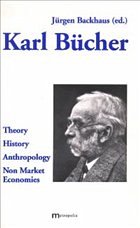This book is devoted to the work of Karl Bücher (1847-1930), who's contributions to economics lie in the fields of economic history with a heavy emphasis on anthropology, but further on specific theoretical derivations and applications striving to understand specific economic institutions, old and new, as well as attitudes and customs that seem to be at odds with mainstream economic teaching. Among the attitudes, we can think of his insistance that charity is an important element in a modern market economy furthering and deepening the division of labour and that hence gift exchange is an important compliment to contractual exchange based on monetary values. Charity has an important place in his work.The essays collected in this volume have all been originally prepared for this publication, and they try to show the broad spectrum of Bücher's work, without being able to claim that every aspect has been explored fully as it would befit a scholar as important as Karl Bücher.Again as it typifies the approach of many working in the context of the program of the Historical School, Bücher tried to use the evidence as and where he could find it. Imaginative is his analysis of the impact of rythm on the process of work which he supported by studying songs sung at work, relating them to the different technologies used and the type of work done. Yet he was also an avid reader of the international financial press that had by the first decade of the 20th century just started to develop. As in the case of Pareto, his evidence often consists in press accounts. Insight into the importance of financial media for economic research and teaching actually led him to launching the first school of journalism in Germany.Contents Drechsler/Kattel: Karl Bücher in Dorpat Peter Senn: Music and Economics Hudson: Music as an Analogy for Economic Order in Classical Antiquity K.-H. Schmidt: Innovations and Vocational Training. Bücher's View and Actual Perspectives Kanamori: Bücher and Japanese Labour Songs Reheis: The Creativity of Slowness. From the Rhythm of Work to the Rhythm of Life Reinert: Bücher and the Geographical Dimensions of Techno-Economic Change Peukert: Bücher on Early Societies Gross: From Bücher to the Formalist-Substantivist Debate in Economic Anthropology Hudson: Bücher's Role in the Evolution of Economic Anthropology Giouras: Division of Labour and Societal Formation in the Work of Bücher Ursula Backhaus: Non-Market Exchange in Healthcare: Lessons from Karl Bücher J. Backhaus: Gift Exchange in a Modern Economy: A Case Study in the Spirit of Bücher Daastoel: Transport and Civil Liberty. Bücher's Contribution J. Backhaus: A Visit to Bücher's Library Drechsler: A Scholarly Biography.

